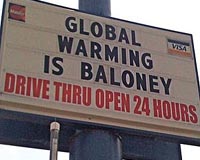| . |  |
. |
New Haven CT (SPX) Feb 26, 2010 More frequent tropical cyclones in Earth's ancient past contributed to persistent El Nino-like conditions, according to a team of climate scientists led by Yale University. Their findings, which appear in the Feb. 25 issue of the journal Nature, could have implications for the planet's future as global temperatures continue to rise due to climate change. The team used both cyclone and climate models to study the frequency and distribution of tropical cyclones (also known as hurricanes or typhoons) during the Pliocene epoch, a period three to five million years ago when temperatures were up to four degrees Celsius warmer than today. The team found that there were twice as many tropical cyclones during this period, that they lasted two to three days longer on average than they do now, and that, unlike today, they occurred across the entire tropical Pacific Ocean. "The Pliocene is the best analog we have in the past for what could happen in our future," said Christopher Brierley, a Yale postdoctoral associate and an author of the study. "We wondered whether all these storms could have contributed to the warmer climate." In fact, the team discovered a positive feedback cycle between tropical cyclones and upper-ocean circulation in the Pacific that explains the increase in storms and appears to have led to permanent El Nino-like conditions. Today, cold water originating off the coasts of California and Chile skirts around the region of tropical cyclone activity on its way to the Equator, where it results in a "cold tongue" that stretches west off the coast of South America. During the Pliocene, however, the team found that this cold water could not avoid being hit by one of the many tropical cyclones, which would churn up and mix warmer water into it. This warming at the Equator led to changes in the atmosphere that in turn created more tropical storms-and the cycle would repeat. The team hopes to study how much mixing could result from tropical cyclones in today's ocean waters-something that is hard to incorporate in global climate models, said Alexey Fedorov, an associate professor at Yale and lead author of the paper. Fedorov cautioned that there is not necessarily a direct link between what happened during the Pliocene and what might happen in the future, as the team's results for this epoch differed in many respects from current projections for future global warming. For example, the existing consensus is that, while the number of intense hurricanes will increase, the overall number will actually decrease. "However, unless we understand the causes of these differences, we will not be sure whether our projections are correct," Fedorov said. "Changes in the frequency and distribution of these storms could be a significant component of future climate conditions." Other authors of this paper include Kerry Emanuel of the Massachusetts Institute of Technology. Funding for this study was provided by the National Science Foundation, the Department of Energy Office of Science, and the David and Lucile Packard Foundation.
Share This Article With Planet Earth
Related Links Yale Climate Science News - Modeling, Mitigation Adaptation
 The Role Of Mass Media In Climate Change Skepticism
The Role Of Mass Media In Climate Change SkepticismBoulder CO (SPX) Feb 24, 2010 Mass media have been a key vehicle by which climate change contrarianism has traveled, according to Maxwell Boykoff, a University of Colorado at Boulder professor and fellow of the Cooperative Institute for Research in Environmental Sciences, or CIRES. Boykoff, an assistant professor of environmental studies, presented his research at the annual meeting of the American Association for the ... read more |
|
| The content herein, unless otherwise known to be public domain, are Copyright 1995-2010 - SpaceDaily. AFP and UPI Wire Stories are copyright Agence France-Presse and United Press International. ESA Portal Reports are copyright European Space Agency. All NASA sourced material is public domain. Additional copyrights may apply in whole or part to other bona fide parties. Advertising does not imply endorsement,agreement or approval of any opinions, statements or information provided by SpaceDaily on any Web page published or hosted by SpaceDaily. Privacy Statement |